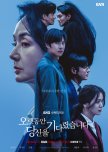
A fancy, unusual treat for crime thriller fans
"Longing for You" offers crime and more at its best. Nice to have along the way: a bit of salt in the fresh air of the coastal town where two of the protagonists grew up in.The public prosecutor's office and the police form a special investigation unit in the case of a serial killer. Solving the case is one thing - an that is overrun by further victims. The internal dynamics within the team as well as emotional complications between further characters are another. Both crime case and complex personal dynamics being jointly combined within a splendidly explosive mixture make “Longing for You” a fancy, unusual treat for crime thriller fans.
We abruptly stumble into an opaque spider's web. The KDrama thrives on its bizarre, strangely interwoven relationships. Abyssal. A bit chilly at times. Mostly harsh and brusque. But sensitive and touching in well-placed spots, too. Suspenseful until the end. Whenever you think you have a clue, the story takes a new, unexpected turn. As I said, a fancy, unusual treat for crime thriller fans.

More than a classical romance this is about the elite education hype, Gangnam mothers & scandals
"Crash Course in Romance" ... well.Starting with the title, makes me jump right into my criticism. Don´t get me wrong. It doesn't concern the KDrama itself. On the contrary! Yet, this international title business... again I don't know why... (well, I'll probably never understand it...) Why does the international title have to suggest a completely different story? Why does (in this case) Netflix for the international audience want to present something completely different than the tvN (co-)production? Why can't the story announce its story for what it is in the first place? In this case: A KDrama about the one shot scandal involving Gangnam's one shot math teacher. A story about Gangnam rivalries between students, between mothers, between teachers. A story about Gangnam scandals that can easily destroy lives... There is also a love story (or two) on the side, but if you tune in specifically for the romance, you have to see how you´ll deal with what is actually offered. (I would guess that might be a bit disappointing.)
Surely, a romance is brewing, but in fact it's the characters, the story and the context around it that create a substantial with plenty of life of its own – apart from the amorous relationship dynamics. There is something like a criminal case, too. It get´s more and more dramatic. Gripping, even. Overall, as a dramaturgical leitmotif, with a socially critical wink it nonchalantly pokes fun at the recent education hype. At the same time condemns, too. So, in fact, this is something completely different than the title suggests.
I last saw, experienced and appreciated actress Jeon Do-yeon almost 5 years ago in the KMovie "A Man and a Woman". She is not an international superstar, but a nationally respected and recognized actress in film and television. Besides her mostly profound and meaningful play, here she also shows a clownesque, quirky, yet adorable side. She is actually 50 by now. However, here she plays a woman in her 30s. Imagine that. Here (as well as most recently in 2022 in the KDrama "Twenty Five Twenty One", where the main actress, as a 31-year-old, slips into the role of a senior high school student,) it is working. In fact, this gives the characters more lifelike substance, apart from just being 'young and pretty'. At least that's my opinion. Some may be more critical about this casting-philosophy. However, in South Korea it probably bothers less. The number of viewers has exploded over the course of the 16 episodes: from almost 1 million to more than 4 million.
The competitive advantage here, that generally carries this KDrama and sets it apart from the Rom+/-Com of many a style, is substance and grounding that comes with life – a life which is hard enough, for the protagonist at least. She may run light-footedly down the streets and take life's challenges in a sporty manner, but she has also lost some feathers along the way and made severe sacrifices. She´s past her youth by now. But she stands in the middle of a sound and solid life.
The male protagonist, too, has already experienced a lot in his vita, including some unpleasant encounters with life – despite everything he seems to be living in the fast lane at the moment. Among other things, with his stress-related eating disorder, he brings in a topic of the time that is comparatively rarely addressed in series - if only marginally, and certainly not among men. Here the eating disorder is even the hook for the encounter between the two protagonists...
Nevertheless, "Crash Course in Romance" has a upbeat side to it. ...It´s the clown's job to bring some jokes and fun into bitter seriousness – some say that you should be able to laugh about your own life, otherwise you are probably not taking it seriously enough... Others say, you should be more serious about bringing wit and humor to your life… Whichever you prefer, this KDrama here and there contributes to that, while the background against which the plot unfolds is actually peppered with serious jabs at the normal madness of South Korean everyday life in Seoul, south of the river - in Gangnam: The educational stress and pressure to perform among the students, among their mothers, among teaching staff, as well as in tutoring academies. It´s serious stuff. There is stalking vs. MeToo, social media terror, escape tendencies up to suicide, you name it. Bitter seriousness here becomes the hook for plenty of drama. And these dramaturgical stumbling blocks (or rather metal balls in this case) keep getting in the way of two hearts that want to beat faster. Nothing compares to a scandal in Gangnam. That keeps the characters within the story on their toes, and the KDrama audience superbly entertained.
Re.: Romance... yes, there is.
The two of protagonists sort of stumbled into it. That wasn't on the agenda for either of them. Besides they aren't the youngest any more... (Don't worry: for the younger generation among the viewers, the KDrama also offers a touch of amorous teenage vibes in the subplot with the 'daughter' of the protagonist and her two admirers...) In any case, the love story of the protagonists is told with delicacy, sensitively, but humorously, maturely and at the same time chastely. Given the circumstances under which the two protagonists led their lives, this is quite authentic. In general, unnecessary cotton candy is avoided.
As so often, I initially had no idea what to expect from this KDrama – at least there was none of the totally hip superstars and no incredibly new or exciting story. I almost overlooked the KDrama because it's rather inconspicuous. I didn't have high hopes at all. And yet, just because everything seemed so banal about it, it made me curious. It's fascinating how this story was able to wrap me up with its idiosyncratic dramaturgical narrative style. Once again one of those productions that are becoming spectacular in their unspectacular way...
Well, if only it weren't for the title...
…but I already mentioned that at the beginning...
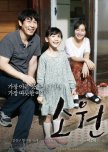
Even though what happened is unfathomable, despite all the tragedy, the deeper focus is on hope
A true story. Not the only one of this kind, unfortunately. This one took place in South Korea in 2008 and was filmed in the KMovie "Hope" in 2013. (In the original: "Wish" - the meaning of "Sowon", the name of the eight-year-old protagonist.)This film production, which was shown in neighboring Asian cinemas, too, achieved great success largely through word of mouth. The story is shocking and touching, while the film adaptation laid its focus less on exploiting the crime itself, than on sensitively dealing with how it affected the little girl, her family, friends of family and classmates. It's less about the incredibly unscrupulous, brutal act than about the family's struggle to continue to come to terms with the unfathomable and the consequences on a wide variety of levels - psychological, physical, social, financial, legal, media-related and everyday practical.
“Hope” received quite some film awards. Despite all the heartbreaking tragedy, the KMovie deliberately intents to touch people in a positive sense. The KMovie wants to open up an, nevertheless, optimistic perspective towards a life 'after'. This, obviously, is tough and challenging. Surely it takes time and even more patience. Heart-rending in this context, for example, is the wonderfully authentic portrayal of the massively threatened father-daughter relationship. Unexpectedly, though, some light comes into the darkness. Sol Kyung-gu - in the role of a desperate father, whose daughter is in danger of slipping away from him due to her terrible experiences – apparently did not take off his distinctive costume throughout the entire shoot in order to maintain high contact with the emotions and their intensity the whole time. And Lee Re, in her debut on the big screen as an eight-year-old daughter, also touches the heart, as does Uhm Ji-won, who initially apparently didn't have the courage to take on her role of the mother. She is also deeply touching with her convincing acting that gets right under your skin.
Even though, what happened is and remains unfathomable, despite all the tragedy, the KMovie explicitly focuses on hope. This way, throughout those 122 stirring minutes it is not all grim all the time.
------------------------------------------------------------------------------
SIDE NOTE: --- The Cho Doo-soon case ---
The story refers to a rape case from 2008, when a drunken 57-year-old man brutally raped an eight-year-old girl in a public toilet in Ansan. Being as brutal as he was, the girl suffered permanent damage. However, the man (who before had already been convicted of rape, among other things) got away with only 12 years in prison. He consequently kept up his mantra, that being so drunk that day he couldn´t remember anything. This had already helped him in previous cases. Here too, he was given mitigating circumstances due to his age, the influence of alcohol and his mental state.
The rape in Asan was extremely gruesome. (The details were not in so much details explicit in the KMovie and I also do not want to waste any letter for them here, either.) Suffering from her internal and external injuries, the girl was hospitalized for eight months. She took an artificial anus back home. Medical treatment was followed by psychiatric treatment. A year later she was at least stabilized enough to go back to school. But even several years later in 2020, she apparently can handle harmless cartoons on TV only, avoids any news and tough topics, i.e. she is still extremely fragile and unstable when it comes to the issues involving any violence at all.
The investigation and trial in this case from 2008 didn´t get covered in glory. On the contrary. The public outcry was great and extended, among other things, to a petition to the Blue House for retrial. The case also led to a number of legislative proposals being submitted by the Democrats, which would, for example, suggest to imprison repeat offenders of sexual offenses against minors in special facilities for life, or e.g. concern the legal handling of sexual offenses committed under the influence of alcohol. But in the end they didn't go through, nor did various petitions.
Instead, the electronic ankle bracelet was the method of choice when Cho Doo-soon was released in 2020. The cost of continuous monitoring of Cho Do-soon's electronic ankle bracelet during the first 4 months after release only, was estimated by the Ministry of Justice at over 200 million won (over 140,000 euros). In addition, apparently 71 security cameras were set up specifically to protect Ansan's residents from Cho, who still has his wife and his home there…
By the way, the infamous Cho Doo-soon case was also topic in the K-dramas "Taxi Driver 2", "Voice 4" and "Vigilante".
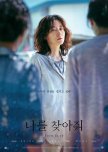
Re. missing children: highly topical, soundly researched, superbly directed and masterfully acted
"Bring Me Home" is a KMovie full of raw reality and emotional impact that disturbingly brings you closer to present day human abyss.Perhaps it would be appropriate to describe this KMovie as a fine study in the nexus between humanity and inhumanity, with the scales being tipped by human compassion. Life becomes barren, cruel, brutal and hopeless when this compassion no longer finds a place among people. But it makes a difference whether a soul has already left the human body and only a cold shell remains, which already lacks any human compassion. Or whether a soul is deeply injured and has only withdrawn far from a dazed body, but at the decisive moment, when human compassion seizes this body and reaches the soul, unexpected energies are mobilized and thus in a kind of holy anger fighting their way out of the pull of gloomy abysses. ...It is compassion that makes a difference in human dignity.
In any case, it is appropriate to describe this KMovie as a highly topical, soundly researched, superbly directed and masterfully acted study about the subject of missing children, or child abduction and child abuse in South Korea.
Howsoever I describe it, the bottom line is the same: "Bring me Back" is a thriller about (in)human abysses. The KMovie unfolds its haunting power through an almost brutal, unimpressed realism, holding up a merciless mirror to a society that seems indifferent to the disappearance of children. "Bring me Back" is a family drama. But it is also rigorous social criticism that explains the particular drama of one (of an alarmingly large number) of South Korean families as a disturbing general social disaster.
Yoo Jae-myung surpasses himself here as dishonest, repellent policeman without shame or sense of duty. Also fantastic: Lee Young-ae. She has already proven herself as an avenging angel in the KMovie "Sympathy for Lady Vengeance". At that time it was about vigilantism as a concept based on principle and planned for a long time. Here it's more of a reflex in the heat of the moment.
Heavy. Gloomy. Still recommendable.
P.S.
Actually, in 2020 (the movie is from 2019) there was a nationwide campaign in South Korea. At that time, 661 children had been missing for more than a year, 638 of them for more than five years. So that they are not forgotten, their faces have now been printed on a wide parcel tape, which is used by the South Korean Post and larger shipping services and can also be used privately. The faces were digitally edited and adjusted to look as they could possibly look today. The central information about their case was also printed on it. (However, I do not know whether this has contributed to the clarification of individual cases yet.)
---------------------------------- SIDE NOTE: --- Missing children in South Korea ---
Human trafficking is not a specifically South Korean issue. However, the continent of Asia is the undisputed leader with 7 countries among the 11 countries with the most victims worldwide. One might not expect South Korea to be at the forefront, but human trafficking is an alarmingly profitable business here, and the trend is expanding - regardless of whether it involves women and children who are exported or imported from abroad, or as Transit country for human traffickers from China or Russia. This is largely beneath the public radar. Public officials are often involved or bribed. In addition, most of the victims here are under the age of 16. This means that they are initially treated 'only' as runaways - this was the case in 80 percent of the solved cases. Thus, the police and authorities are not primarily in charge, but the parents. If the children are among the remaining 20 percent - the kidnapped or abandoned - then unfortunately they are unlucky that they are not searched for with the necessary vigor. At the same time, these minors are among the weakest and most defenseless members of society. They have neither voice, nor life experience, nor strength to really oppose the perpetrators. This makes them easy prey for a lucrative business.
In South Korea, over 99 percent of missing children are found within the first two days. That sounds like a lot. However, for the 1 percent of families who do not find their child during this time span, a nightmare begins that has already driven many parents to even commit suicide. It has been proven that the pain, the struggle with guilt and hope, does not stop in the years and decades that follow.
A figure from 2016: of around 38,000 missing persons reports, half were minors who turned up again within the famous 48 hours. 285 of these missing persons cases could not be cleared up. Among long-term missing minors (according to a 2014 case study), 65 percent were later found dead, and 46 percent of resolved child kidnapping cases revealed they were victims of physical sexual violence.
The statute of limitations marks another problem. As a result, parents often devote their lives to searching on their own, far beyond their means, since no one else will. They however can´t help but keep searching and hoping. They are more likely to lose their job, their social life, their health, or their own life. A 2006 study found that 40 percent of parents who missed their child for years or decades lost their job and spent an average total of around $500,000 in the search. (By now, that sum is likely to be a lot higher.) This includes the money that had to be paid to the number of false informants, or the travel expenses to travel to a potential location where a tip sent the parents. More than once, someone played a prank. Such cases are well documented. But there are also (fortunately) case histories of donors and supporters.
In South Korea, the legal activities relating to missing minors have been tightened again and again in recent years. But the results are still not what one might wish for. A government study from 2021 identifies acute further needs in all areas: from prevention to investigation and prosecution to officials training. Between 2015 and 2020, South Korean women and children were trafficked in increasing numbers. There are always accomplices among public officials, in particular the cooperation between human traffickers and police officers is criticized, which robs the victims of any last hope of help. By the way, in this context, fishing industry on the coasts is also expressly mentioned as a crime scene. Numerous cases of human trafficking and exploitation of workers whose working and living conditions are sometimes disastrous are documented.
------------------------------------------------------------------------------------------
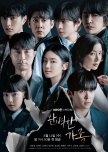
Offbeat! Complex! Intriguing! Not for every taste. Nevertheless, consistent in itself
“Perfect Family” presents itself in the now almost impenetrably dense jungle of the KDrama orbit with an idiosyncratic selectivity. The production, which is carefully selected down to the last detail, contributes to this, as the mimes, music and story are perfectly coordinated and prepared as a splendidly distinctive thriller soufflé. And it is rising so well! Perfect.(I could actually leave it at these words. But for all those for whom that isn't enough...)
The Perfect Family? Does that exist at all? Or isn't that concept made up of a highly controlled lie? Doesn't the control issue inherent in (whatsoever) perfection rob family life of its air to breathe? There are those pretty clean and distinguished in pole position for life. And then there are the ones with the 'loser' card, rather daring and lost, provocatively repulsive. And yet, if you look closely, both are just human beings, with light and dark - neither just saints nor devils.
“Perfect Family” also juggles themes such as friendship and betrayal. (And then there's more to it - but especially with this KDrama, a spoiler would be downright fatal.) In its consistently calm pacing the 12 episodes stroll along by leading us on one wrong track after the other, thus keeping us hooked with our open questions.
Ultimately, the story revolves around what follows a sudden death. At the beginning, together with the young protagonist, we are stumbling from one nightmare of conflicting feelings and confusion into the next. Over time, the confusion seems to clear up. The conflicting feelings, however, remain.
All of this is musically framed by a selected mix of classic classics and plenty of cello, piano, etc. - on top of that there are a few enchantingly soothing songs as a tasty acoustic icing on the cake.
Offbeat! Complex! Intriguing until the end!
In terms of pacing and style ultimately not for every taste, though.
Nevertheless, consistent in itself!
PS:
With a progressive message about the correlation between perfection, family life and authenticity... rounded by the exemplary reflection of when it comes to one's own accountability...
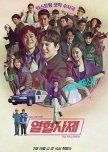
Divine Wrath strikes with unabashed humor, yet healing wounded souls of black, gray + shorn sheep
"The Fiery Priest" is all about Korean humor. You might have to get used to it. At least I did. The first time I approached the series I probably wasn't ready and possibly not in the right mood for such cheerful, tongue-in-cheek fun à la Korean style. I gave up quite early (probably after the first episode). On the second try tough, everything just fell into place. And by now I can say from experience: "The Fiery Priest" is ideal for repeat offenders. I had even more fun then... (And that probably wasn´t the last time I watched...)Nonetheless. Korean humor is special, especially when it comes to the fascination of the intestines - often enough they are gladly celebrated in a wide variety. Here as well. Utter confusion and frenzy are also a must. Instead of tried and tested bar fights and brawls of the western type however, the focus here is rather on choreographed martial arts.
Humor reigns supreme in "The Fiery Priest". Humor determines the pace, the timing, the nuances and the ambience. Slapstick, situation comedy, dialogue jokes, parody, irony - hardly anything is left out. "The Fiery Priest" doesn't take itself too seriously. The central storyline says it all: in the robes of a priest a former NIS agent ensures order and justice. Even the Pope has his brief appearance here. But also the 'sects' with self-appointed saviors flourishing in the country.
And yet, the "The Fiery Priest" has some serious tones to offer, too - besides and in the middle of all the slapstick. The plot background is once again fueled by South Korean backroom liaisons between executive, judiciary, politics and crime. With regard to the personality development of the individual characters, touching emotional moments also come along here and there - comparatively modestly, but nevertheless with impact.
Finally, "The Fiery Priest" also plays out another strength of KDrama: Here you can experience a lot of cheerfully and yet subtly touchingly executed bromance and womance. (However, there's no romance. But nobody has to miss it.) Bromance and womance as well as the variety of embedded side plots inspirit dramaturgical facets, that may touch the heart, having quite something to offer between soft touch and punch. It is simply a pleasure to watch the various dynamic personality developments. (Outstanding actors all along, by the way!)
"The Fiery Priest" spectacularly succeeds in balancing a tightrope act - good-humoredly and mischievously dancing above an unspeakable swamp of injustice, bribery, abuse of power and human greed.
Divine Wrath strikes with unabashed humor, thus along the way healing the wounded souls of the black, gray, and shorn sheep.

Dynamite is lurking everywhere that could bring the Empire down... but who dares to set it on fire?
First of all: should you watch "The Empire"? In any case. Yes! But: The KDrama isn't funny or soul food at any point... Rather, it provokes by intelligently and multi-layeredly confronting the ugly sides of the glamorous world as well as the almost hopeless rebellion against it."The Empire" stylizes the world of that top 1-10 percent, that outrageously wealthy and influential elite of society who can afford a lifestyle that the rest of society dreams of. At the same time, this elite presents itself as mendacious, bigoted, moral scum. Dynamite is lurking everywhere and could explode at any moment. The KDrama paints a dull, tired, bored, vile, quarreling picture of the rich - not a radiantly beautiful one brimming with vitality. Wealth is displayed in a feudal manner, but it seems a bit pietistic, even from the outside it's rather cold, empty, stale and sad. The color saturation has been reduced accordingly. Some clichés are tickled. Privileged decadence is predominant. Elitist arrogance rules the luxurious, isolated orbit of a calculating, selfish family dynasty. Everything here is expensive, bare, distant, decadent, and nothing is welcoming, warm, beautiful, or friendly. With all that wealth and success, no one is free or happy. ´Trust´ is a foreign word in this family. This makes the KDrama hard to bear in places.
The conservative elite in "The Empire" feigns progressiveness by throwing snippets of English into their conversations. However, this seems artificial (dramaturgically quite effective) and (yet) not very convincing, rather quite strange, because their arrogant fantasies of exclusivity are nothing more than mendacious, feudally inspired traditions, old energy full of cobwebs. When the young, life-disappointed but highly talented student brazenly appears in front of the self-proclaimed aristocrats on her vendetta, it is downright unheard of. But basically it is exactly that and much more of it, what it takes to push the dusty elitist behavior to its limits and ultimately really abolish it. There is no awe in this young woman. It may be that she has the courage of the desperate. Never mind After all! The modern system is already stumbling through her presumptuous impertinence. Interesting that this brave young woman is actually introduced as the bad guy - because we as viewers see the story (initially) through the indignant eyes of the self-ennobled nouveau riche - those who want to represent a class of their own and who are used to directing fortunes behind closed doors according to their interests. To a certain extent, the dramaturgy identifies 'us' with those who govern the "Empire". 'We' are identified with order being maintained and respected. And yet it is difficult for 'us' to side with them. This elitist world presents itself as too lost, too sick, too decadent. ... This collision of two worlds is highly explosive and wonderfully depicts the inner turmoil and contradictions within society.
In between, the journalist seems a bit helpless as a plaything for those who provide her with information for her interests. Despite all the bite she has, she is first on the hunt for her own professional success. The 'thing', what needs to be researched and uncovered, becomes a means to a personal end. Journalism, with its democratic mission, is thus also floating on the edge of decadence and gives little hope. (Yet, hope there is...)
And then there is the protagonist Han Hye-ryul: herself a child of that problematic, ambivalent elite, third generation of the empire full of influential lawyers founded by her grandfather. At the same time bearer of hope for a modern democratic society. She takes her responsibility seriously and uses the opportunities that her origins gave her in the cradle constructively in the service of the community - she does NOT bend the law according to her personal discretion, but her truly innovative credo is: she sticks to it for ALL binding law. She tries to follow her professional path with true integrity. Such genuine integrity gives hope to the masses. On the other hand, they frighten the elite, because this robs them of the foundation of their shadow power.
However, the torchbearer of legal integrity is, beyond her professional ethics, also a person who grew up in a world full of privileges. As a child of the elite, she not only automatically inherits money, fame and influence, but also old guilt, and when in doubt she is pilloried. As a woman, she has feelings like everyone else. As a wife, or rather a betrayed wife, too. As a daughter. And as a mother too. She is therefore challenged on several fronts at the same time.
"The Empire" tells the story of a woman who, out of deep conviction and belief in a legal system, wants to undermine the autocratic, arrogant elite coalition. However, she is the child of a family that is involved in such things whether she wants to or not. And yet it is precisely this family tradition that makes her the full-blooded prosecutor that she is. By tradition, she wants to do her work excellently and in an exemplary manner. And for her personally, that means cleaning up the mess of backroom deals and exclusive privileges. Finally someone who believes the rule of law is above ALL? And not only that: the protagonist is one with an ego that (luckily in this case?) is strong enough to actually take on the powerful enemies. So is there perhaps still hope for a better, fairer world? "The Empire" works intelligently on this question. There is no easy answer to that. The crushing moral swamp to traverse is overwhelming...
... And then there is the fourth generation in the family clan... the son of Han Hye-ryul. He actually ticks quite differently ... for his part, he is the bearer of hope for a new dimension. He wants to swim his way out of the swamp of tradition, and yet he is torn between his feelings for his parents and grandparents and his own needs and desires. He doesn't dare, and yet...
------------------ Side note: --- Inflation of KDrama productions, in which the rich and powerful take center stage in the context of law and order---
The corrupt networks, which want to reach the top circles and the blue house, have become an almost inflationary context for KDramas and movies. A trend that has already been observed in recent years. But 2022 will surpass everything that has been produced so far. "The Empire" is one of many 2022 productions that settle accounts with the discrepancy between free democracy, responsible citizens and equal rights for all on the one hand and class society, strict traditions, hierarchies and autocracy on the other. "The Empire" unashamedly and unequivocally, without any ribbons or icing on the cake, unveils how difficult and long the road still is - to a society in which citizens are actually all treated equally before the law. There is obviously still one instance of power that in 2022 in South Korea is firmly convinced that it is above the law...
Why is the profusion of KDrama productions, in which the rich and powerful take center stage in connection with law and order, so inflated at the moment? So that it maybe/hopefully slowly really sinks into mass consciousness and from there it gets to each individual that this must/want/can come to an end! So sledgehammer: monarchical Joseon is history! Aristocracy and class society are history! Dictatorship is history. Let's go South Korea! Stand tall, walk tall! Don't be blinded. Don't be tempted to join in with this old class thinking and to feel a little more valuable if you have someone you can trample on...
No more reverence and respect. No more feudal lords and serfs. Actually, this is presented every week in KDrama, in the cinema and in the news: that the venerable elite is actually morally rather underground and such a life is neither honorable nor desirable. But as long as the viewer's gaze continues to be dazzled by arrogant behavior and luxury items and prefers to look past the lazy core, there will (have to) be endless KDrama variations with sometimes bigger or sometimes smaller sledgehammers. But that's not surprising either, because the centuries, even millennia-old, tradition teaches something completely different... it has been class-thinking all along...
Nonetheless. South Korea counts the year 2022. It is official: We (even in KDrama Land) ALL have a value and worth regardless of origin, past or future - not just a few percent wearing particularly expensive clothes. Wealth or poverty or anything in between and beyond is independent of a person's worth before the law. If we, who apply the law, still act according to ´other´ laws, allow ourselves to be seduced and bought and used, secretly hoping to be able to take such a quick shortcut further up, then it is our own fault. No one has the right to beat us, use and exploit us and throw us away after use like garbage! No one.
----------------------------------------
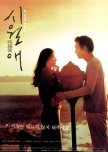
"Il Mare" gently sprays its quiet magic as if through an atomizer.
"Il Mare" is the ´international´ title of this KMovie. However, the original title (rather being translated as "Across Time") does not refer to the place - a picturesque house by the sea - but to what actually happens there: a time-transcending correspondence. Strictly speaking, the letters are sent back and forth in a mailbox over the distance of 2 years. What an unprecendeted plot for a love story to be told in a truly unique way! This story became famous in America and Europe in the 2006 US film adaptation starring Keanu Reeves and Sandra Bullock.Actually you shouldn't compare the two movies side by side, but most people do, so...
The South Korean original was made in 2000 and starred Lee Jung-jae, who was in high demand in South Korea at the time, and Jun Ji-hyun, who was just beginning her career. (Actually you can sense the difference in her acting back then and in her more recent productions. In the meantime she definitely has matured from a ´mere´ beauty into a spirited actress.) While the original shares the same plot as does the US remake later on, the South Korean version places more emphasis on the mood of the protagonists, stressed by using imagery, color and atmosphere. Accordingly, the South Korean original is characterized by less color saturation and less light than the US remake, as both protagonists - Eun-ju and Sung-hyun - are rather disappointed in life, taciturn, withdrawn. The loneliness and emptiness in the protagonists´ lifes is one aspect. The remote house by the sea something completely different. It might perfectly fit into the protagonists´ mood, but in addition it actually has quite some magic to offer: Besides framing and emphasizing the beauty of nature there is the dog as a harbinger of relationship and the mailbox as a bridge between hearts. Thus the overall sensitively told story slowly but surely fills with joy, smiles, laughter and increasingly radiating light.
The KMovie "Il Mare" gently sprays its quiet magic as if through an atomizer.
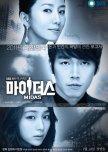
Balancing genius, intuition & healthy grounding in an elite jungle of an addictive financial world
How far can you go? The focus of these KDramas is greed for BIG money, which has long since lost any reasonable connection to life and people. It's about stock deals by the super-rich, insider trading, short selling, mergers and acquisitions.Hiding behind the title "Midas" is the legendary story of the ancient King Midas. It is said that as a child, ants would put grains of wheat in his mouth while he was sleeping. He was later granted a wish by Dionysus, wishing that everything he touched would turn to gold. The consequences though were life-threatening, because actually everything he came into contact with turned to gold, including food and drinks... The story of the KDrama operates both with the dictum "to have a golden hand", which is inspired by this legend, and with the psychoanalytic concept "Midas complex", which has proven itself in connection with pathological greed.
The protagonists in "Midas" have an offensive urge, almost addictive, to make even more profit with daring investment strategies, sometimes risking to lose the ground under their feet and maneuver themself into existential situations. This KDrama is about the challenge of balancing genius, intuition and a healthy grounding within the elite jungle of an addictive financial world. Thrilling story, complex character studies and emotional rollercoaster are guaranteed. In this world where money, intelligence and high speed set the tone, the intuitive feeling for the right timing prevails. "Midas" broadens the horizon from the (rather usual) Jaebeol family intrigues and inheritance disputes, which also have their place here, to - without regard to losses - partly illegal machinations in the financial world.
"Midas" is sketching a world of high risk and high numbers - abstract, fast pace, fashionable, cold. Yet it is an emotionally intense in-depth study about temptation, including space and time for morals. However, a spot here and there, where the warm and tender wind blows, is given, too. Some call it love...

Here the heroes individually are insignificant, helpless. Together they can make a difference.
"Falsify" (also "Distorted") tells an exciting story about the business with official truth. I think this works particularly well as the KDrama offers a critical examination of the rather difficult concept of 'truth', which can be bent and manipulated depending on the eye of the viewer. Is the rule of law just a pretty farce? Rather an eloquent backdrop for the mighty who operate in the shadow? Does actually anything like justice exist? What truth are we hearing? Which one do we want to hear? Which preferably not? Is it always so good to bring the truth to light?Regarding the recently common term 'lying media', used as an accusations from all different directions, "Falsify" offers a burning issue. Also a bit of an 'Watergate Affair' in South Korean garb (as the underlying case resembles some real South Korean one). Sophisticated journalism and sensation-hungry tabloids, public prosecutors and lawyers as law enforcement officers, so called respectable (yet cheating) businessmen as well as gangs are all frighteningly close together. Against this background, seldom has sich wide range of positions, attitudes and motivations been thus successfully intertwined and presented close to touch on the basis of individual fates, altogether mixed up in an exciting story. Abysses open up in view of social ideals and their illusions. And yet hope is not lost in the face of (quite deadly) superiority.
This is definitely not a ´Marvel´-like (super)hero story. Here the 'heroes' individually are insignificant, inconspicuous, fallible, and to some extend helpless puppets in a complex mechanism that is controlled by opaque forces. However, together they can make a difference in co-creation - by bundling their potentials, throwing their prejudices overboard, getting involved with each other, learning to trust each other (despite initial contempt), and no longer reflecting on what separates them. The key is a unifying idea that is bigger than each individual (with their physical, emotional or social needs). They want to give this idea shape, body, weight and charisma with all imaginable creative means. This cross-personal idea is what gives them strength (even in the face of massive personal threats) and overcomes fear. Here it is the idea of a democratic constitutional state in which there is justice for ALL; in which ALL are equal before the law; in which every citizen can/must bear responsibility for his/her actions - the price for the freedom of responsible citizens: a minimum consensus of laws, rights and obligations that are binding and binding for everyone.
This idea sounds nicer and more promising than it really is, because it usually stays with the idea that is trampled on behind the scenes. Yet, it is (real) people who fill this (abstract) idea with life. But where there are people, there are also their corruptibility, their greed, their vulnerability to blackmail and their cowardice, as well as the fitting people to unscrupulously exploit such weak points. South Korea's young democracy and long history of corruption and mighty ones operating in the shadow offers a realistic, scandal-ridden environment to process this exciting and at the same time outrageous KDrama - thus offering a wide range of gray tones, emotionally differentiated and authentic.
By following various protagonists from the press and the courts, the story begins with individual threads of action that are at best loosely connected to one another, but which become entangled over the course of the story and together form a strong strand that everyone can pull on together. So a bit of patience is required from the audience, but it pays off! The differently motivated characters come to life in a tangible way, become comprehensible in good and bad and reveal a reality about the business with truth that makes you shudder. We as the audience are ourselves cleverly integrated as part of the story - as representatives of public opinion and thus as perpetrators and victims at the same time.
Wow!
Good job. Ambitous. Thought-provoking.
P.S.:
Also ideally suited for repeated series enjoyment due to the differentiated, complex story.

High-end KDrama story-telling/performance quality - emotionally complex, captivating, touching.
Society in trouble. "Angry Mom" confronts viewers with some unloved topics. Bullying comes first and keeps the door open for one more... and one more... and one more... and one more... It's about the attitude of the parents when it comes to education and school, about prejudice, discrimination against women, male-dominated hierarchies, pedophilia, the power of the powerful...If it weren't for the comedy (even just the fact that the mother, in her mid-30s, puts on a school uniform again and goes to school), it would all be hard to bear. Also, the protagonist's former school friend was deliberately portrayed in an exaggerated manner. She and the gang of men she leads often look like they're straight out of a cartoon - she herself is sometimes reminiscent of the Red Queen from Alice in Wonderland. Her scenes always provide a breather with a little exaggerated fun, even if the bitter seriousness does not fall by the wayside.
The comedy has nothing to do with a charming blinking. It only serves as a channel for anger and dismay (of the viewers). The story itself isnt´t all too easily digestible. The daughter is being bullied, but no help can be expected from the official authorities. The mother does the work herself (absolutely marvelous: Kim Hee-sun!). Without frills, she stumbles right into a male-dominated snake nest in the high school environment. The further she courageously advances, the more unexpected help she gets. However, no one else would dare for themselves, although many do not like what is going on. ... If she would not be a mother with her child being affected, she would probably have given up too...
This is once again high-end KDrama story-telling/performance quality - emotionally complex, captivating, touching.
Don´t miss it.

Sisterhood in a man´s world. Let yourself get both annoyed & inspired by politics behind the scenes
What a wonderful power show inside out politics. Yes, it's ugly and you might want to smash right into it. Often enough and plentifully. But it also has its heart in the right place. Repeatedly. Dealing with politics may make you doubt the meaning and purpose of democracy. But it doesn't get any better without those intrepid heroes willing to stand up for a better world. One may sometimes lose faith in something like a democratic gene in people. But one can always hope and fear. The game is only over when it is over. The election is not over until the votes have all been counted.Stupendous women. On both sides of the front. And the men? Oh well. So and so. (And if many people complain about Lee Geung-young because of his scandal, he at least prefers to choose the role of the challenging guy, where one can wholeheartedly consider him disgusting...)
Well, I consider the sisterhood thing being the crucial message for me in this story. Yes, there are strong, competent women, who, against better female instincts, cling to old structures and customs - in the wake of the Jaebeol clan. Yet there are those competent, motivated, witty, loyal to higher ideals women, too, who are sharing those ideals with others and walking side by side. Even if tempted and seduced they still sense what is right and wrong and act on that when in doubt. Using and abusing (interchangeable lackeys) for personal gain vs. appreciation and recognition (of brothers and sisters) are very sensitively compared here as common HR strategies and management styles.
With 11 episodes (only), Netflix slips through the story fairly quickly - only the most necessary input about the protagonists are given. However, especially the actresses don't let the story rush past you. Kudos to (in this case in particular) the heart and soul of the Ahjummas and a storytelling that, while strikingly handling the political landscape for its stringency, nevertheless spreads the complex mixture of motives, hopes and fears in a well-sorted manner.
Does the end justify the means? This age-old question apparently never ages. "Queenmaker" makes you think, but also often leaves you terribly annoyed about the way things are. The KDrama makes you angry, demoralizes, and yet: at the same time it gives hope. Strong women, a strong story, an often enough an ugly world in which, however, once again each individual contributes to the fact that it could be one way or another...
Obviously I would recommend it - if you´re in the mood for something like that. And: obviously there are no Idols and no Love Story involved. People may die, but it is no crime story. It isn´t funny, either. Nevertheless, I would say, you should check it out and let yourself get both annoyed and inspired by politics behind the scenes.
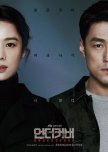
It is about the basic conflict between political ideals & dirty practice. Emotional complex.
Black meets white and every shade in between.Devious meets sincere.
Truth comes into conflict with truthfulness.
Justice wrestles with just behavior.
Even though the KDrama “Undercover” was produced as a remake of a British series, it still tells a very specifically South Korean story. In recent decades, the South Korean intelligence service has changed its name several times in the wake of turbulent political changes. Heads were exchanged here and there, but ultimately numerous agents and executives carried out their jobs both during the last years of the dictatorship, the first years of the increasingly democratic liberal government of the Sixth Republic and up to the present day. This means that those who had to be bitterly persecuted as enemies of the state at some point, became, at a different time, those who potentially needed to be protected at all cost… “Undercover” is set in that context.
Embedded in this is the emotional dynamic of a former undercover agent and his wife. She is now a committed human rights lawyer and the designated director of the newly established political office for corruption investigation. In principle, her agenda is to uncover those machinations in which her husband's employer was involved or even in charge at the time and to this day...
The dramatic dynamite is hidden underneath the fact that the husband missed the right timing of confessing to his wife what he actually had done before and who he was... for good reason. This secret apparently didn't stop the couple from leading a very happy family life to date. But fatally, his past comes knocking at his door, confronting him with an almost insoluble conflict.
Should he confess to his wife today what he did back then? However, she might never be able to forgive him. That would most likely be the end of the relationship.
On the other hand, if he continues to hide his past, his former colleagues will make sure she finds out. They would do anything to prevent an upright, honest and incorruptible person from taking this groundbreaking new political position, simply because transparency and secret service don´t get along so well…
Therefore:
If he wants to preserve the marriage and his family, his wife must never find out about his past. In order to prevent this, with a heavy heart he has to once again face the parallel world of secret service agents...
If he wants to protect his wife, considering the challenges of her new career, with a heavy heart he has to once again face the parallel world of secret service agents...
Either way, with a heavy heart he has to go back to the parallel world of secret service agents... There, it seems, not much has changed in the past 30 years. It is all about: unscrupulous in the service of the cause. By all means. Failure is not up for debate, whatsoever.
Accordingly, “Undercover” is full of emotional suspense, rather complex, and at times quite nerve-wracking. It is about the inner conflict within in this particular, rather mature marriage. It is about the basic conflict between political ideals and dirty practice. And then, it is also sobering when it comes to the question of whether power can ever really belong to the people...
I liked the emotional complexity and how the area of conflict – personal and political each – was developed. Plus the fact, that it was more about relationship dynamics than action. Therefore, I enjoyed watching it.

Us walking along in those indifferent (?) shoes of Han Gong-ju is the great power of this KMovie
Among independent South Korean film productions, “Han Gong-ju” is considered one of the most successful to date. In fact, the number of viewers exploded within the first week - through word of mouth alone. In addition to this vote with feet, there were consistently positive (national and international) film reviews and awards."Han Gong-ju" offers relentlessly haunting independent KMovie quality, frugal, not easy to digest, yet calmly, subtly and sensitively told, too. Behind the seemingly indifferent attitude of the protagonist, highly concentrated emotional force blazes subliminally, which is released less in the protagonist herself than within the audience. By the way, the story is based on a true story. (More background below - but that's quite a spoiler... so if you want to watch the film, you might want to read it afterwards!)
The KMovie tells the story of the fictional Hang Gong-ju in a rather reserved manner. We initially follow the girl without knowing what it is about or what she actually has experienced. Over time we learn to understand, or better: vaguely guess what she was and is going through. Over 112 minutes we see and experience the world vaguely through her eyes. This is a great power of this KMovie. The girl´s everyday world is fundamentally threatening, unwelcoming and cold, almost merciless. Han Gong-ju herself is tough and clear, demure and mostly indifferent. (Hang Gong-ju may by now have learned to face her world with indifference, but we as audience? We may feel differently here and there…) Nevertheless, she also has learned to create islands in her life that offer at least some minimalist beauty, joy and perspective.
What happened and is happening to Hang-Gong-ju admits of no excuse. But unfortunately it happens everywhere. Not just in South Korea. Unfortunately, again and again, more and more often. *
The role of adults is also inexcusable. It is we so-called 'adults' who lay, or should lay, the foundation for a sense of justice in the upbringing of our children. However, in this story (and its true background) it failed spectacularly. On several fronts. The results can be considered rather grim.
As solid and reliable role models that 'we' adults are/should be: how do we actually relate to right and wrong? Parents who would rather protect their beloved children from the consequence of their (any) actions, than confront them with it – yes, that's understandable. But will the 'children' learn from their mistakes in the future (without any true feeling of guilt about having done something wrong)? So that they might not replay their misbehaviour in the future? Rather not. However, if everyone prefers to proclaim an exception rule for themselves (and their loved ones), that cannot work out well. So it always ends in fighting and stabbing... by any means.
The irony: For cinema and television this is actually quite wonderful, because thus there are always new, stirring stories to tell. In the case of "Han Gong-ju", fortunately the entertainment gain does not come from dramatically exaggerated voyeurism, but rather from the fact that we walk a part of the truly sobering track in those indifferent (?) shoes of Han Gong-ju. By doing so, clues putting the (difficult to digest) puzzle together accumulate...
Lee Su-jin's KMovie is consistently serious, unpretentious and at the same time convincingly authentic in the presentation of the protagonist. Chun Woo-hee in her difficult role as Han Gong-ju is also outstanding and masterly in this context!
-------------------------------------------------- -------------------------------------
SIDE NOTE: --- Events at Miryang Middle School in 2004 ---
Over a period of just under a year, at least 44 (but possibly more than 120) high school students repeatedly raped three 13 to 17 year old girls and filmed them in order to blackmail the victims. The gang rapes obviously happened as a purely entertaining pastime for the boys.
The first 14-year-old victim was blackmailed with the film recording to bring her younger sister and her older cousin to the subsequent 'meetings', who then also became victims of renewed gang rape. In addition, the victims were forced to pay so that the footage would not be published. There may have been even more victims.
As unforgivable as these actions are, dealing with them was even more unforgivable. After the girls' aunt reported the case, of 44 clearly identified repeat offenders, only three were initially actually arrested. Due to massive public pressure, 9 more were taken into custody and a further 29 were officially arrested but not taken into custody.
There were no serious consequences for the perpetrators. On the contrary, the victims became victims again! On the one hand, they suffered psychological damage during the interrogation due to insensitive, confrontational confrontations and verbally abusive male officers (even though the victims had expressly asked for female officers). On the other hand, parents tried to force the actual role of perpetrator on the victims due to provocative behavior.
Finally, the defenders pointed out that some of the boys are already about to enlist in respectable universities and would soon contribute to the shining future of the city. In general, the parents of the perpetrators managed to build up pressure in various directions and also helped with money to box their boys out of the annoying situation. Among the victims' parents, on the other hand, one father unforgivably exploited his daughter's predicament for his own benefit. Ultimately, only 5 boys were tried in juvenile court. Without serious consequences. They are now probably fathers themselves and are firmly established in their careers.
In the meantime, this and that may have changed legally (and also when it comes to investigating), in South Korea and Germany and in other countries, too. But still, in current cases of juvenile sexual offenses, to date a strong tendency among parents here and there is increasing to wanting to box out their loved ones by all means possible, regardless of the losses. Far too rarely is attention paid to reflecting to their sons (and/or daughters) when they in fact tremendously misbehaved, that, yes, they are still loved and ok, BUT THEIR ACTING IS NOT OK at all. As a matter of course they will have to face the consequences – as serious misconduct that the social community we live in does not tolerate.
… However, our problem is: 'we' obviously DO tolerate it... Over and over again.
Sadly, in this respect, the KMovie “Han Gong-ju” is as topical as it was in 2013.
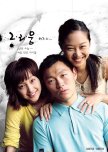
Anti-heroes. Down to earth. Authentic. Harsh. Compassionate. No Cinderella story, yet a love story.
I stumbled across this comparatively 'old' KDrama (2002) because of actress Gong Hyo-Jin. But actually here particularly Lee Na-young and Yang Dong-geun impressed me with their strong and down-to-earth performance. Once again I discovered a little gem of early KDrama art.Rather tranquil. True to life. Authentic. No fairy tale. No Cinderella story. No power games of the mighty, but simple everyday life of anti-heroes. Yes, down to earth. Very. I was delighted. This KDrama - like "My Mister" or "When the Camellia Blooms" - is centred around a quite authentic, ordinary world. Not spectacular. Neither in action, nor in scenery. The story is also not about the rich, beautiful, successful people that are always welcome, but about those who are less noticed (in the media): about ordinary people who didn´t have an excellent education, yet earn their money somehow. It is about a world comparably most people unfortunately live in - about their worries, hardships and, if it can´t be avoided, illnesses, too.
In its centre: a young, inconsiderate, unwieldy pickpocket who is confronted with the diagnosis of brain tumor. It is about the people in his immediate environment: family, friends, girlfriends, police. About a love traingle. About choices in life. Reconsideration, too. That's not really 'exciting'. But touching. Unspectacularly impressive. A mirror of compassion and humanity.
"Ruler of your own World" dates back to the early days of KWave. At the time, this KDrama was not as successful (also internationally) as i.e. the productions of the "Endless Love Series". However, it was highly valued and appreciated in its own country for the authentic story (with comparably hardly in KDrama otherwise frequently elaborated makjang). "Ruler of your own World" is considered the ´best´ serial production of 2002 (vs. "Winter Sonata" as the most ´successful´ of the same year.)


 9
9 41
41 15
15

















